
We get to test a lot of full suspension mountain bikes here at Singletracks, but admittedly they don’t often fall under the $3,000 price point. That’s part of the reason I came up short recently when some friends were asking for recommendations. Full-suspension bikes often start at a price upward of $3,000 and some of the bikes that generate the most conversation on the internet are three times that amount, leaving the feeling in the air that all full-suspension bikes are out of reach for some budgets.
But, there are some outstanding options out there now. While some mountain bikes are more expensive than ever, especially with electronically-operated components now on the market, the value-oriented bikes on this list indicate that as a whole, quality mountain bikes have likely become more attainable. All of the full suspension mountain bikes on this list are from brands that we work with often for mountain bike reviews, and though these brands might have a $10,000+ bike in their catalog, their $2,500 bike often has the same geometry and suspension design.
We don’t want to make this a listicle for the sake of getting readers to find out who made the list, but rather to help steer someone toward a great, value-oriented full suspension trail bike. We’ll highlight the bike, talk about why we’d recommend it, and note where it might fall short in some areas. It’s also worth noting that we can’t guarantee availability on most of these, and there’s a good chance they could be hard to find, though not impossible. Call your local bike shops and ask around, and you may have some luck.
The following bikes are ordered by price, from least to most expensive, with all priced under $3,000USD.

1. Marin Rift Zone 29 2 Trail Bike
- MSRP: $2,299
- Available at Jenson USA or compare prices
Marin is known for making great bikes at a decent price. The Marin Rift Zone 29 2 is as the model name indicates a 29er, with an aluminum frame, and it comes in sizes S-XL. The Rift Zone has 125mm of rear travel and comes with a 130mm fork.
Why we recommend it: The Rift Zone is a shorter-travel trail bike with a good parts spec and geometry that will inspire confidence for new riders.
The Rift Zone 29 in a medium has a 455mm-long reach, a 65.5° head tube angle, and a low standover height, which should give riders a stable feeling aboard the bike. The 1,186mm wheelbase is fairly long, but should keep the bike responsive on singletrack, and the 76° seat tube angle should put riders in a great seated climbing position.
Marin has a pretty solid parts kit on this bike, including a RockShox shock and Recon Silver RL fork, a 12-speed Shimano Deore drivetrain, and a TranzX dropper post with appropriately specced travel on each size. The Vee Flow Snap tires are also a great trail tire choice that we’ve had good results with.
Buyers may want a set of more powerful brakes eventually, but these 2-piston Shimanos should be plenty reliable. Size medium riders also might be happier with 170mm-long crank arms, but overall this is a decent spec for this bike. Marin also makes a Rift Zone 29 3 for $3,000 and a cheaper Rift Zone 29 1.
Who it’s best for: The Rift Zone 29 2 looks like a great entry-level full suspension bike that should be comfortable on green, blue, and some black trails with suspension travel that sits in between cross-country and trail categories, and geometry that adds confidence.
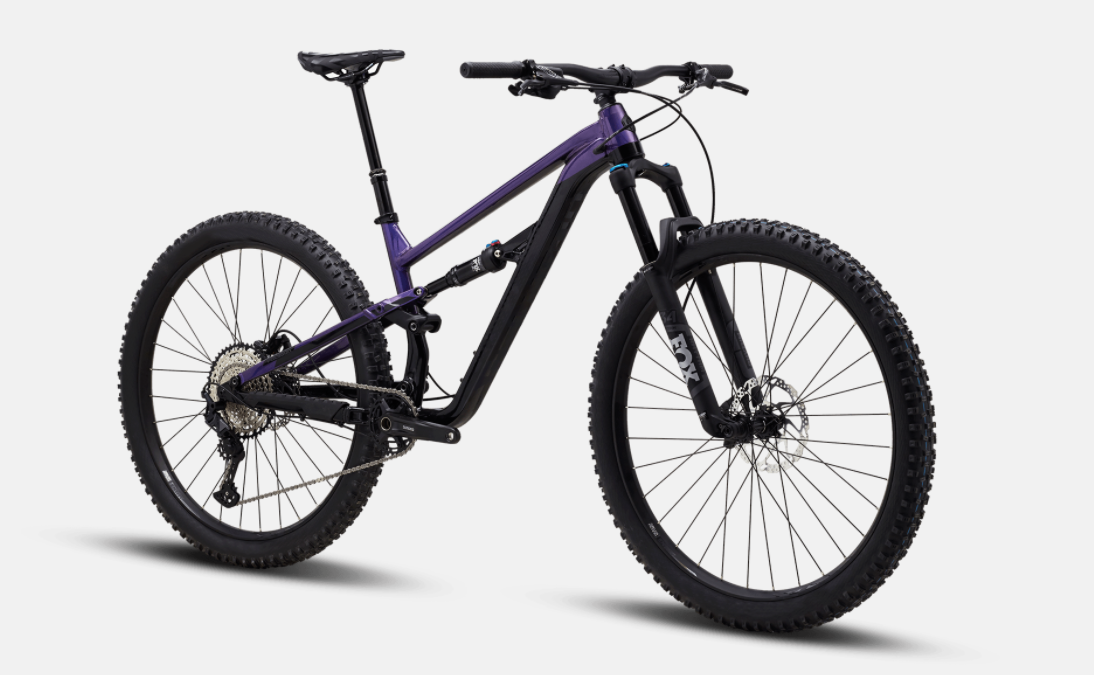
2. Polygon Siskiu T8 Mountain Bike
- MSRP: $2,399 ($1,999 sale)
- Available at Bikes Online
Polygon is another direct-to-consumer brand that packs in a lot of value. Their Siskiu full-suspension bike is available with 27.5″ wheels or as a 29er and the T8 build retails for $2,500. The T7 build with different components is priced at $2,000, but the extra money for Fox suspension looks to be well worth it.
Why we recommend it: The Siskiu has 135mm of rear travel and a 140mm fork. This build gets a Fox 34 and a Fox Float DPS rear shock, with an OEM cockpit, a Shimano 12-speed SLX drivetrain, and Tektro 4-piston brakes. While these seem like minor differences, there are a few components that are notable here, compared to the other full suspension bikes.
One, the Siskiu T8 has 4-piston brakes, and as mentioned, a Fox 34 fork and DPS shock, which are usually an improvement over the RockShox Recon fork and Deluxe shock.
The Siskiu’s geometry is not far off from the other bikes included. A medium 29er gets a long and stable 460mm of reach, with a relaxed 65.5° head tube angle, and a 1,193mm wheelbase which should help make it a competent descender. The seat tube angle is 76.5° which should make it a comfortable bike for climbing.
Who it’s best for: Polygon drives a hard bargain with this bike. The Siskiu T8 looks great, the geometry is modern, and the components are all well-chosen, and the mix of Fox and Shimano means that riders will have a reliable setup.

3. Kona Process 134 Full Suspension Mountain Bike
- MSRP: $2,599
- Available from Kona Bicycles or compare prices
Kona’s Process 134 has been a go-to full-suspension mountain bike for years, and they have several price points on the mid-travel bike going all the way up to $7,000. This $2,600 build starts the party right, with Kona describing it as a bike that is excellent “for someone looking to dip their toe into full suspension mountain biking.” It has 134mm of rear travel and comes with a RockShox Recon RL 140mm fork up front. This bike is available as a 27.5 or a 29er.
Why we recommend it: Geometry is in line with other trail bikes. A medium has 450mm of reach, a short seat tube and low standover height, short chainstays, a 66° head tube angle and a 76.5° seat tube angle. The geometry is similar to the Rift Zone above.
The build kit is quite similar too, though the Process 134 has an 11-speed Shimano Deore drivetrain, Shimano MT201 2-piston brakes, A TranzX dropper post, and WTB wheels.
Who it’s best for: Kona’s Process 134 brings a great frame design and a tuned linkage-driven single pivot suspension to the masses with a more affordable build kit. The geometry and suspension design should bring a lot of value to this bike, while saving money on components. Kona has several other build options, with the next one up priced at $4,000.

4. Specialized Stumpjumper Alloy Mountain Bike
- MSRP: $2,800
- Available at Specialized
Specialized needs no introduction and countless mountain bikers have started on a Stumpjumper, one of the longest-living mountain bikes out there. The latest Stumpjumper has 130mm of rear travel paired with a 140mm fork and 29-inch wheels.
Why we recommend it: The Stumpjumper maintains its status as a great full-suspension trail bike and has continuously evolved. This aluminum frame still uses the Horst link 4-bar suspension, whereas the carbon frame uses Flex Stays to save weight.
Specialized has done away with traditional sizing, now using an S1-S6 scheme. The brand has a fit chart for size recommendations, and the S1-S6 can generally be equated to XS-XL as the geometry is in line with those sizes.
The geo is also in line with the other trail bikes on the list, with the medium having 450/455mm of reach depending on the frame’s flip-chip setting, a relaxed 65° head tube angle, a steep 77.5° seat tube angle, and a 1,208mm wheelbase length.
Since Specialized brands a lot of their components in-house, the Stumpy is equipped with the Purgatory and Butcher tires. Buyers also get a TranzX dropper post, a SRAM SX Eagle 12-speed drivetrain with an 11-50t cassette (helpful for steep climbs), a RockShox 35 Silver fork, an X-Fusion shock, and Tektro 2-piston brakes.
Who it’s best for: The seat tube angle on the new Stumpjumper is notably steep, and stands out on this list, as does the 50t granny gear on the cassette. Riders with steep climbs in their area will want to look at this bike, but this should also be a great bike for everyday trail riding. Most of the other geometry numbers and components are in line with other trail bikes on this list. The next Stumpjumper build up, the Alloy Comp, is priced at $4,000.
See Gerow’s review of the Specialized S-Works Stumpjumper here.

5. Fezzari Cascade Peak Full Suspension Bike
- MSRP: $2,999 ($2,499 sale)
- Available at Fezzari
Fezzari is a Utah-based, direct-to-consumer bike brand and another D2C company that injects a lot of value into its bikes. The Cascade is their aluminum trail bike, with some great component choices. Their Signal Peak, one that we loved riding, is a carbon cross-country bike with a $3,000 build option, but the Cascade Peak’s components offer a more compelling reason to stick with alloy.
Why we recommend it: The Cascade Peak is a 130mm travel trail bike with a 140mm fork, and the option to run either 27.5+ or 29-inch wheels.
As a 29er, a medium has a short seat tube and short chain stays, a 66.4° head tube angle, and a 75° seat tube angle. The wheelbase is 1,162mm and the standover height is 754mm. Overall, the geometry on the Cascade Peak is a little more conservative than other bikes on this list, but the bike should be plenty capable for newer trail riders and the numbers suggest that it will be an agile and responsive ride.
Where the Cascade Peak pulls ahead of others is on the build kit, as this bike gets a SRAM GX Eagle 12-speed drivetrain, a DVO Diamond D1 fork, and a Fox Float DPS rear shock. Other components include an X-Fusion Manic dropper post, Stan’s Flow rims, and Maxxis Minion tires. The Cascade Peak also gets the most powerful brakes on this list, with the SRAM G2 R brakes.
Who it’s best for: The Cascade Peak is a great option for people who want to pay a little more up front for better components. The SRAM GX drivetrain is hard to beat, and so is the suspension setup on this bike for the price. The geometry is a little conservative compared to other bikes on this list so it may not be the best option for the most aggressive riders, but the Cascade Peak should be a great option for all-around trail riders.
See Jeff’s review of the Fezzari Cascade Peak here.

6. Rocky Mountain Element A10 Downcountry Bike
- MSRP: $2,699
- Available at Jenson USA or compare prices
Rocky Mountain recently revised the Element, transforming it from a dedicated cross-country bike to an XC/trail bike. Now, the Element A10 hits the “precise sweet spot between lightweight cross-country climbing prowess and technical precision.” The new Element is available with 27.5″ wheels on size XS, and 29″ wheels on sizes small – XL. The full suspension mountain bike has 120mm of rear travel with a 130mm fork.
Why we recommend it: The Element is the latest in the “downcountry” genre that blends XC pedaling capability with technical confidence. How does this happen? Geometry, basically.
The Element has a 65° head tube angle, 450mm of reach, and a 1,200mm wheelbase for plenty of stability on the descent. These are all on the “slack” setting of the bike, as it has adjustable geometry. Even in this setting, the Element has a pretty steep seat tube angle for climbing.
The parts spec with the A10 build matches with other bikes on this list. The Element gets fast rolling WTB Trail Boss tires; a Rocky Mountain dropper post; a Shimano Deore 11-speed drivetrain and 2-piston brakes; and a RockShox Judy Silver fork and Deluxe Select shock.
Who it’s best for: The Element is a great bike for people who want to pedal. The latest generation certainly looks more capable than the previous, but the bike is still specced for riders who want something they can put miles on. At the moment, pricier Rocky Mountain Element builds are on sale with prices under $3,000 like the A30 which is normally $3,300 but is $2,300 right now.
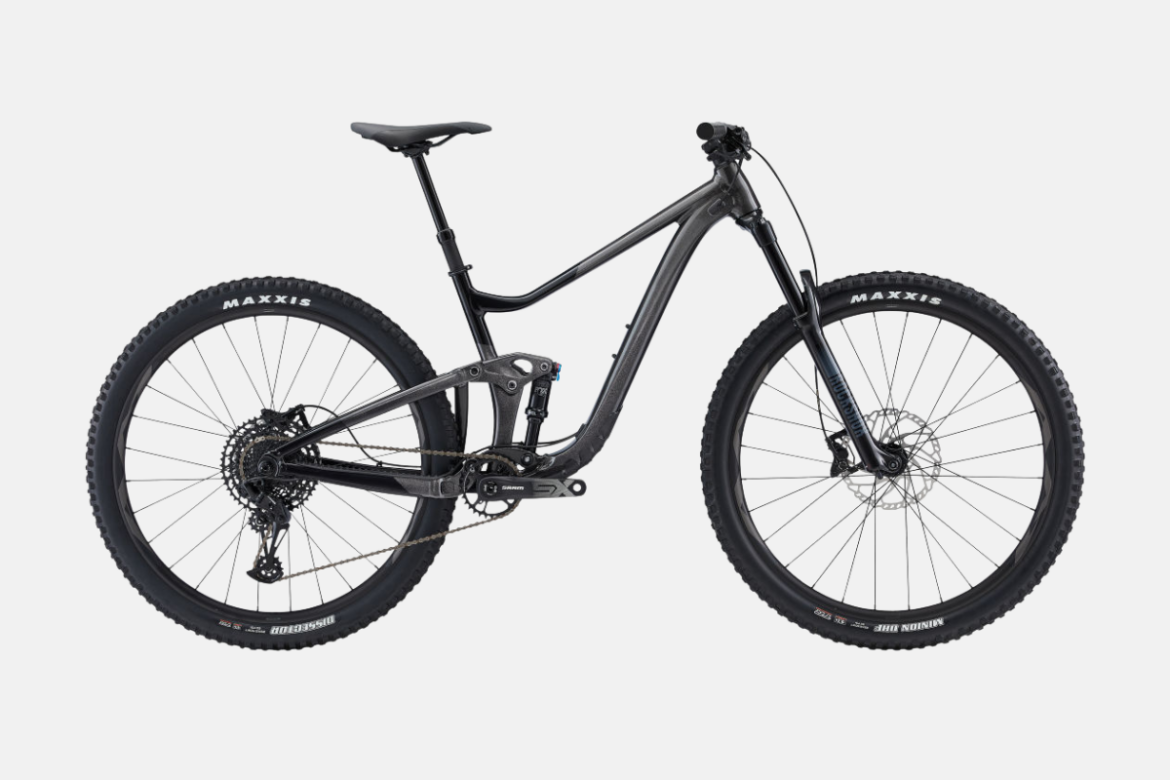
7. Giant Trance X 2 29
- MSRP: $2,800
- Buy from Giant dealers.
The aluminum Giant Trance X sits right in the sweet spot for trail bikes with 150/135mm of suspension travel front and rear. The roughly 66° head tube angle puts riders in control on the descents while the almost 78° seat tube angle promises a comfortable climbing position. Rare for bikes at this price point, the Giant Trance X 2 29 has two-mode, flip chip adjustable geometry.
Why we recommend it: The Trance X 2 comes with Maxxis tires and a tubeless wheelset for reliable control on the trail. And the Maestro floating pivot suspension on the Trance X uses the same design as much pricier bikes from Giant. The included Fox Float DPS Performance shock is custom tuned for Giant to deliver maximum performance.
Not all of the bikes on this list feature a 12-speed drivetrain so it’s great to see Giant speccing a SRAM SX Eagle drivetrain. Many of the parts like the saddle, bars, and grips are Giant branded; they aren’t the flashiest but are generally solid. Dropper post sizing is fairly generous across the sizes, with mediums getting 150mm of travel and large and XL models getting a full 170mm.
Who it’s best for: The Giant Trance X is a trail biker’s trail bike. It’s a balanced bike that will serve riders well for after work rides and also longer weekend rides.

8. Canyon Neuron 6
- MSRP: $2,599
- Buy from canyon.com
Canyon sells bikes direct to consumer which keeps prices low. The alloy Canyon Neuron 6 delivers a ton of value with nice touches like integrated chainstay protection, rattle-free and easy-to-use internal cable routing, and mounts for two water bottles AND a tool roll inside the front triangle.
Why we recommend it: The latest Canyon Neuron is UDH-compatible so buyers aren’t limited to drivetrain choices when it’s time to upgrade. Not that most will be in a hurry; the Neuron 6 build comes with a SRAM NX Eagle 12-speed drivetrain. Name-brand Schwalbe tires, Fox suspension, and SRAM brakes round out the part spec.
Like the Giant Trance, the Canyon Neuron 6 is sits comfortably in the middle of the trail bike zone so it’s versatile enough to take along on both pedally and shreddly rides alike. The geometry is progressive but not overly so, with a 66° head tube angle and a 76° seat tube angle, and reaches that are medium to longish.
Who it’s best for: The Canyon Neuron 6 is a bike that’s pretty much ready to ride right out of the box, literally. New riders and first time buyers might be apprehensive about buying a bike directly online, but Canyon provides excellent support and the included assembly instructions are dead simple. Most buyers will be up and rolling within 30 minutes.
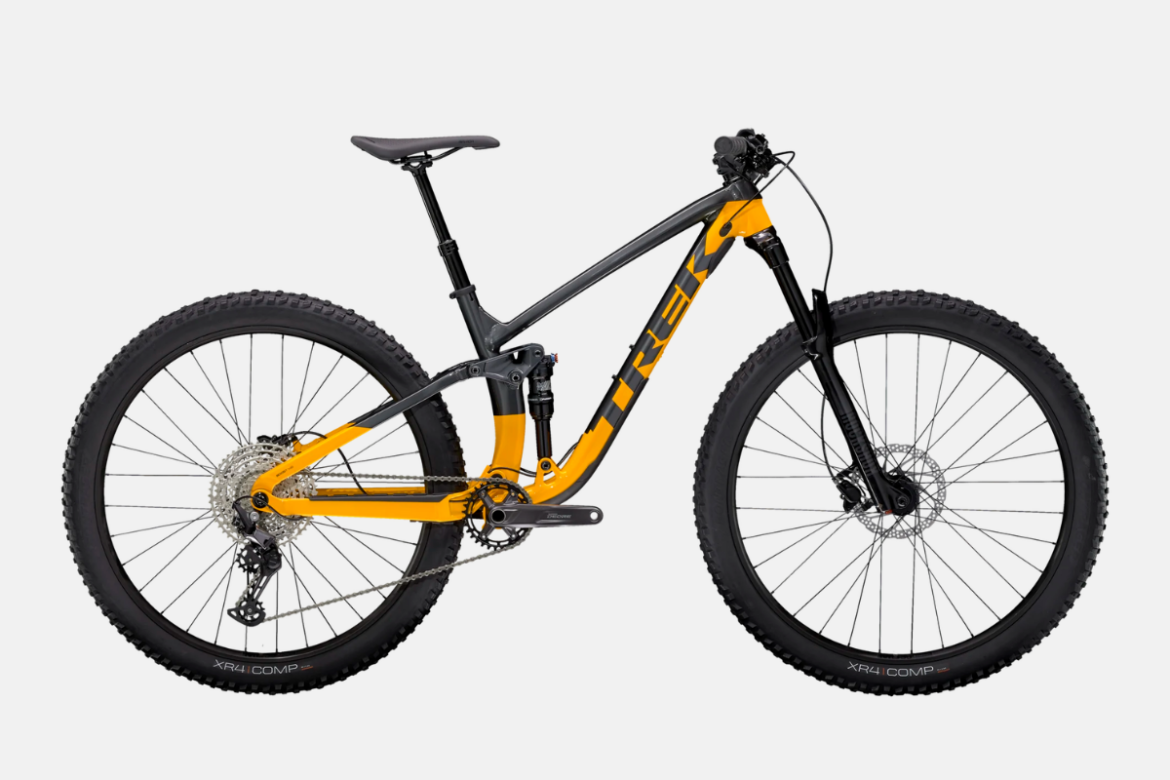
9. Trek Fuel EX 5, Gen 5
- Price: $2,499
- Buy from Trek.
You really can’t go wrong with the Trek Fuel EX. The Fuel EX was a trail bikes before they were even called trail bikes, and Trek has refined the bike over the years resulting in dialed geo and suspension kinematics. The Fuel EX 5 Gen 5 isn’t the latest Fuel EX — that would be the Gen 6 models — but it looks like Trek will continue selling these for at least the next year or two. The upshot: a sub-$3,000 price point on a bike that’s more nimble than the latest and greatest, and lighter weight too.
Why we recommend it: The Trek Fuel EX is available in a wide range of sizes, from XS to XL which means it’s a good fit for most riders. With 140/130mm of suspension travel front and rear, the Fuel EX is a non-nonsense trail bike that’s extremely popular for a reason.
Like the much pricier Fuel EX models, the EX 5 utilizes an Active Pivot Braking suspension design that separates acceleration and braking forces to maximize control. Then there’s Knock Block that protects your frame (and your body!) from bar impact in the event of a crash. This build ships with a Shimano 12-speed drivetrain, RockShox suspension, and Bontrager tires.
Who it’s best for: The Trek Fuel EX 5 is the bike to buy if you don’t want to spend a lot of time and stress choosing a trail bike. Get it, ride it, love it.

10. YT Capra Uncaged 10 AL
- Price: $2,999
- Buy from yt-industries.com
For $3,000, the YT Capra Uncaged 10 is easily the most rad bike on this list. With a coil shock, mixed wheels, a170mm Fox 38 fork, and a bomb proof frame this is a bike that begs to be pointed downhill.
Why we recommend it: It’s rare to find a decently specced enduro bike for under $3,000. We don’t usually see SRAM GX Eagle drivetrains at this price point, and buyers also get Crankbrothers wheels, Maxxis tires, and SRAM Code R brakes with massive 200mm rotors.
One notable drawback to the YT Capra Uncaged 10 AL is its weight: 37+ pounds. If that’s an issue, consider upgrading parts as they wear out, as this is a bike that’s designed to be used and abused.
Who it’s best for: The YT Capra Uncaged 10 AL is the bike for mountain bikers who are long on ambition but short on cash. And if you want a slightly different spec, the Capra Core 1 can be purchased as a 29er or MX, and with RockShox suspension.

Honorable mention
The Ibis Ripley AF is definitely worth a look if you’re comfortable spending just a little over $3,000. Many models are currently on sale so you might even be able to snag one for under three grand.
Takeaways from the bikes
If you’re lost after reviewing all of these full suspension mountain bikes, then worry not. They all kind of blend together at this price point. As I was writing this, I noticed a lot of the same components over and over. Most of the bikes have the same RockShox Recon or 35 forks and Deluxe rear shocks, aside from the Fezzari and Polygon which use either Fox or DVO. All of these bikes utilize a single-pivot or Horst link for their suspension designs.
Most of these bikes also use the same Shimano brakes and SLX or Deore drivetrain, except for the Fezzari again, which uses a SRAM GX drivetrain and G2 brakes. With the budget-friendly component packages, all of the bikes will probably be on the heavier side, weighing between 32 and 34lbs. Based on the build and price alone, the Fezzari probably has the best build, considering the suspension, brakes, and wheels, but the Polygon is a really sweet deals too with Fox suspension.
All of these bikes have fairly similar geometry, with longer wheelbases, and slacker head tube angles for better descending, and all of them have steeper seat tube angles for seated climbing, but read each section for notes on where one might perform differently than another.
And, as mentioned above, they are all very similar in geometry, components, and intent, meaning that none are outright better than another at this price point. Buyers won’t be mistaken choosing one over another here, and the decision may come down to which brand speaks the loudest to them unless of course availability is an issue.















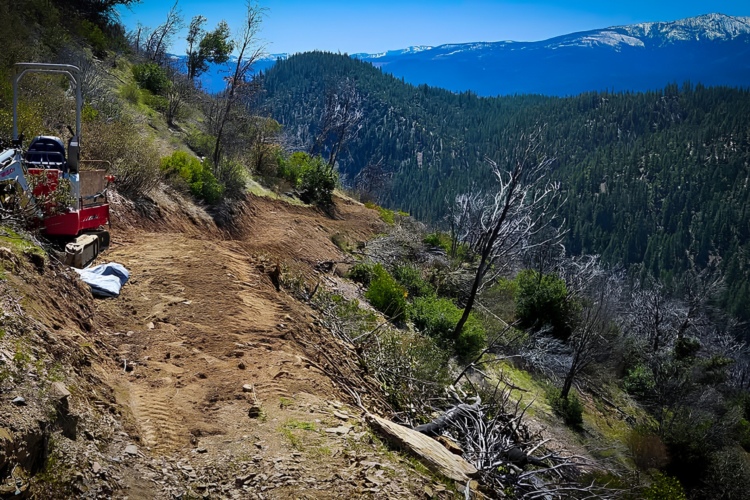
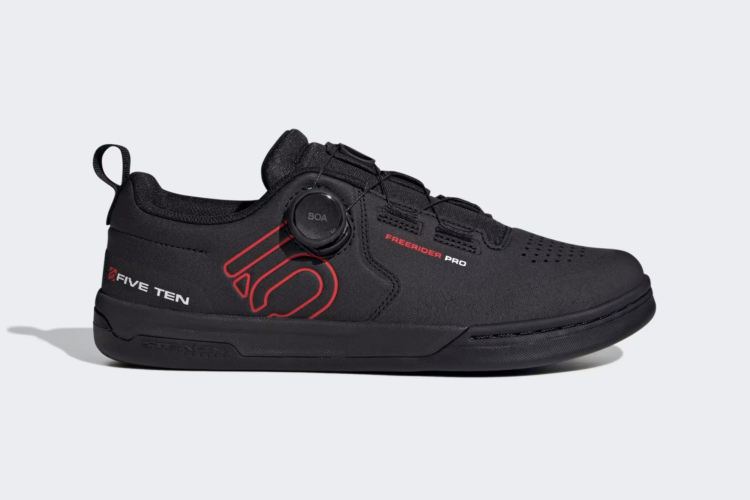

13 Comments
Oct 25, 2021
I owned the Marin Rift Zone 2 for a time, but found it heavy and sluggish -- I expected more zip. Lighter wheels helped some, but it still was a chore to ride. The Giant is a well-balanced, high-value package that gets the job done. I'm 69 years old, 5'9" tall, 150 lbs. and have been mountain biking since 1984. The Giant is probably the best mountain bike I've ever owned. YMMV.
Oct 26, 2021
Oct 28, 2021
Oct 27, 2021
Oct 29, 2021
Oct 30, 2021
Oct 25, 2021
Oct 25, 2021
Oct 25, 2021
Jan 23, 2022
Nice rounded compilation Mr. Miller. Any reason why you didn't include the Vitus Sommet or Mythique in this list? The are both well spec'd similar to the others you covered here. And the Vitus geometry is pretty awesome. I've got 2 Vitus bikes and I love them both. Granted I've replaced every component on them both making them ride well above the original spec..and that cost me more then the bikes selling prices but the end results are 2 really rowdy, extremely light bikes that are fast and track straight and true. I've got my Sommet down to 26lbs with 170m front and 160m rear I can throw it around the skatepark bowls and launch the verts and tables with the greatest of ease. Nice job. Hoorah Marine. JG1-5.
Oct 25, 2021
Oct 28, 2021
Oct 28, 2021